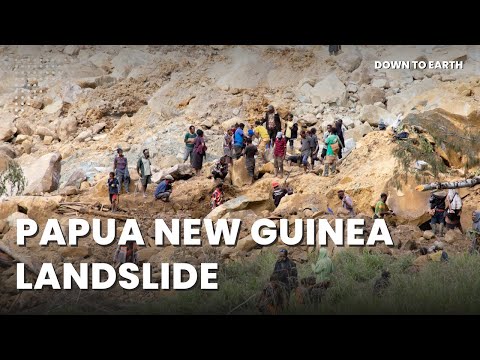With rescue and relief efforts hampered by the remote location, a severed road link, heavy rainfall and nearby tribal violence, the disaster could yet worsen
On May 24, 2024, parts of a mountain in Papua New Guinea collapsed on people staying nearby. More than 2,000 people are feared to have been buried according to government estimates. More than 7,000 residents have been asked to evacuate from the path of the still-active landslide.
Papua New Guinea has ruled out finding survivors under the rubble of a massive landslide, with the exact number of dead under almost two storeys of debris and mud still unknown. The residents have been using shovels and their bare hands to search for survivors.
Papua New Guinea, which lies north of Australia, regularly experiences landslides and natural disasters. The latest landslide is said to be one of the most devastating in recent years. The Pacific country sits on the Ring of Fire — a string of active volcanoes and high seismic activity that runs along the border of two tectonic plates in the Pacific —which makes it highly susceptible to landslide conditions.
Dave Petley, vice-chancellor of the University of Hull in the United Kingdom attributes the country’s regular landslides to a number of specific factors, chief amongst them being the country’s deeply weathered, mountainous terrain and tropical climate.
Heavy rain and storms lead to increased erosion, flooding and higher tides, all of which raise the chance of dangerous rockfalls, according to him.
He explains that there are no indications of a trigger event, such as intense rainfall or an earthquake, adding that they are yet to see if the slope had been subjected to mining or quarrying.
Natural disasters have cost the country more than 500m kina ($126m) this year, before the landslide at Enga, said Prime minister James Marape. “This year, we had extraordinary rainfall that has caused flooding in river areas, sea level rise in coastal areas and landslides in a few areas,” he added.
The UN migration agency has warned of an outbreak of infectious diseases if immediate steps are not taken. With rescue and relief efforts hampered by the remote location, a severed road link, heavy rainfall and nearby tribal violence, Enga provincial administrator Sandis Tsaka warned the disaster could yet worsen.
We are a voice to you; you have been a support to us. Together we build journalism that is independent, credible and fearless. You can further help us by making a donation. This will mean a lot for our ability to bring you news, perspectives and analysis from the ground so that we can make change together.










































